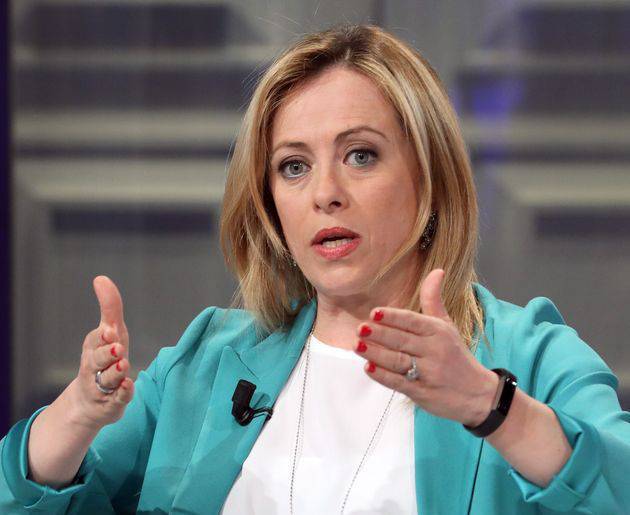She is, in any event, unlikely to be outflanked on the right and is unlikely to go wobbly on the war in Ukraine. Giorgia Meloni’s victory in Italy’s parliamentary elections is as decisive as it is historic. Her conservative coalition won the day, obliterating the left at the polls. Ms. Meloni’s Fratelli d’Italia (“Brothers of Italy”) garnered more votes than her two major partners — Matteo Salvini’s Lega (“League”) and Silvio Berlusconi’s Forza Italia (“Go Italy!”).

Giorgia’s soaring popularity, though, has caused a bit of friction in the fold. Expect horse trading among the trio before she is named prime minister. Mr. Berlusconi will advocate for Antonio Tajani as foreign minister. Mr. Salvini, who has been eclipsed as the darling of the right, will bide his time.
The political scuttlebutt has it that Mr. Salvini may seek to undermine Prime Minister Meloni from within, perhaps criticizing her for a shortage of alacrity in responding to the refugee crisis in the Mediterranean. Or he might joust with Giorgia over insufficiently large tax cuts.
Given her political strength, though, and her partners’ relative electoral decline, Giorgia will not be outflanked on the right. When it comes to her resolute stance against Russia’s war of aggression in Ukraine, Ms. Meloni will not go wobbly.
As the director of the Institute for International Affairs at Rome, Nathalie Tocci, declared: “I put my hand today on fire that she is not going to bend.”
Whereas Messrs. Berlusconi and Salvini were one-time political bedfellows of the Russian strongman, Ms. Meloni did not dicker with Putin the Impaler. This was reflected in the congratulations to Ms. Meloni sent by President Zelensky, who said: “We look forward to a fruitful collaboration with the new Italian government.”
Despite the left’s attempt to turn the election into a plebiscite on fascism, Benito Mussolini was not on the ballot. The right didn’t win the critical supermajority to amend the constitution, but it could still propose a presidential republic via a referendum.
In a recent interview with CNN, a former Italian prime minister, Matteo Renzi, a figure of the center left, allowed that while he opposes and will continue to oppose Ms. Meloni, she poses no risk to democracy. She will become the first female prime minister since the Magic Boot’s reunification in 1861.
President Sergio Mattarella is expected to make within a few weeks the appointment of Ms. Meloni. Having disintegrated the glass ceiling, the leader of Fratelli d’Italia demonstrated that the Seed of Aeneas is more than a patriarchal polity. Ms. Meloni vows that it “will not be the usual ‘spaghetti and mandolin’ Italy that fails to show up when history beckons.”
In a victory speech, the woman who reinvented Italy’s political right appealed to all Italians: “We haven’t arrived — this is a starting point. From tomorrow, we have to demonstrate what we are worth. It’s time for responsibility — we won’t betray Italy. . . We will govern this nation on behalf of everyone.”
The issues confronting the Meloni government are daunting. Ukrainian forces have exposed the hollowness of President Putin’s war machine, but the Russo-Ukrainian conflict drags on. Winter is coming, and both Germany and Italy will bear the brunt of Mr. Putin’s cutoff of cheap energy.
How will Prime Minister Meloni respond? In many respects, she is more of a Thatcherite than Britain’s own prime minister, Elizabeth “Liz” Truss. Ms. Meloni’s campaign called for deregulation, infrastructure revitalization, and overall tax reform — as well as a commitment to build the Ponte sullo Stretto — the world’s longest suspension bridge spanning Calabria and Sicily.
How, though, will Ms. Meloni contend with her bête noire at Brussels? A few days before the election, the pesky president of the European Commission, Ursula von der Leyen, issued a veiled threat to Italy’s conservatives: “If things go in a difficult direction, I’ve spoken about Hungary and Poland, we have tools.”
Is Ms. von der Leyen channeling Josef Stalin? No doubt Ms. Meloni will work with the EU. National sovereignty will be non-negotiable. And no amount of bullying from Brussels will change that. The incoming premier wants to reconfigure the earlier reforms that Italy agreed to with the EU. Italy is slated to receive nearly $195 billion in post-Covid recovery grants and loans.
The advent of a Prime Minister Meloni refutes the stereotype of a macho Italy. Her achievement is rooted in the nation’s classical heritage. The Romans believed men and women to be inherently equal, as historians Roger Vigneron and Jean-François Gerkens detailed in The Emancipation of Women in Ancient Rome.
The Italians of antiquity created a state, they write, where “the rule of juridical equality was the duty to be pursued.” Today, Giorgia Meloni’s triumph is as much a victory for feminism as it is for the Magic Boot. -RAI




thanks for sharing and helping to demystify the Italian Political process…we have our unique issues here but there’s are just as complicated! And usually the case… the behind the scene people are also around, in both systems,
…a big thing in the USA was/is term limits…and a coalition was pushing for them locally.(sounds like a good idea) ….but my issue with term limits is, there are no term limits for wealthy people/lobbiest to purchase candidates…..one of these power brokers was upset when I brought that up to him. Regardless of the party…he had a stable of politicians beholden to his donations……..few politicians are wealthy enough to stand up to these power brokers…..such is the high cost of running for office….
Let us give her a chance, the left had their turn. They have record and we will see what she does. The Italian people will then have the opportunity to keep her or vote her out of office